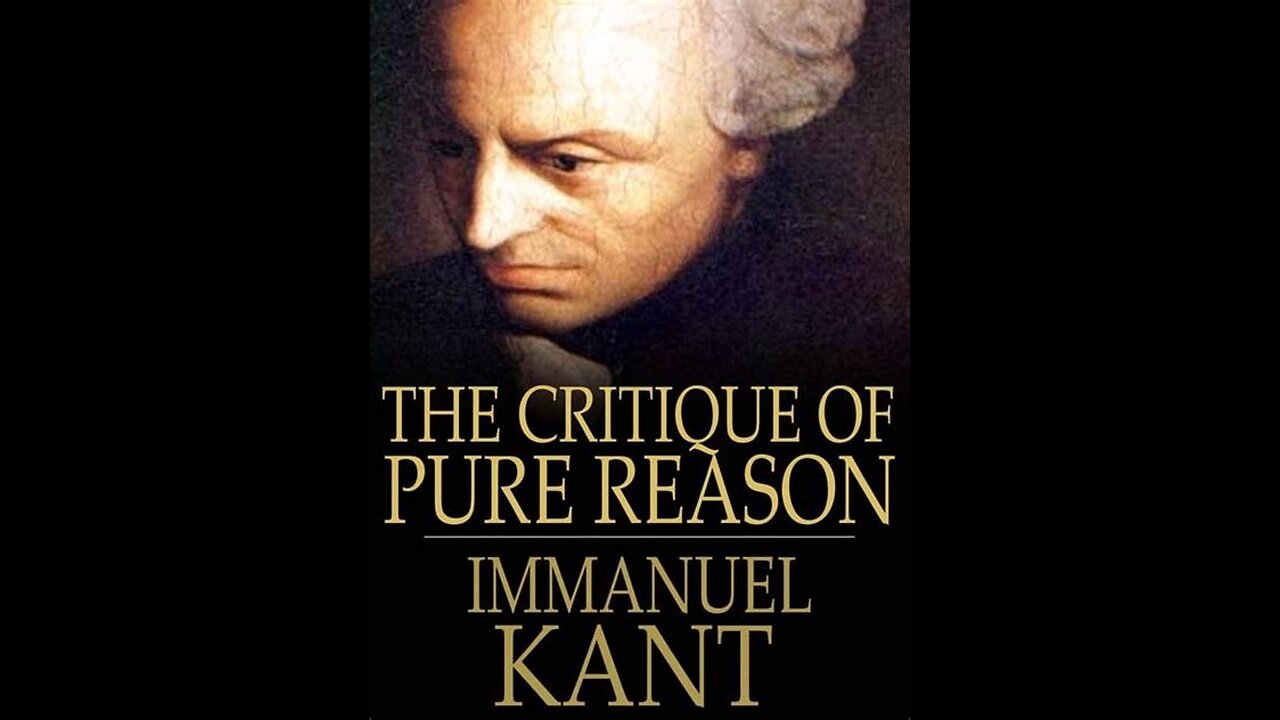Premium Only Content

The Critique of Pure Reason by Immanuel Kant | Summary and Critique
Buy Here: https://amzn.to/40qUZ87
"""The Critique of Pure Reason"" is a seminal philosophical work written by Immanuel Kant in 1781. It is considered one of the most important works in Western philosophy and epistemology. The book aims to reconcile rationalism and empiricism by investigating the limits and possibilities of human knowledge.
Kant begins by examining the nature of human knowledge and introduces the distinction between analytic and synthetic judgments. Analytic judgments are those whose predicate is contained within the subject, while synthetic judgments add something new to the subject. Kant argues that synthetic judgments are crucial for expanding our knowledge of the world, but they also raise questions about their foundations.
Kant introduces the concepts of intuition and understanding as the two faculties through which knowledge is acquired. Intuition provides sensory information, while understanding processes this information through concepts and categories. According to Kant, knowledge is a result of the interaction between intuition and understanding.
One of the central ideas in ""The Critique of Pure Reason"" is Kant's theory of transcendental idealism. He argues that knowledge is not solely derived from the external world but also shaped by the mind's innate structures. The mind imposes its own conceptual framework onto the raw data of sensation to form coherent experience.
Kant explores the possibility of metaphysics as a science and analyzes the limits of human reason. He introduces the notions of phenomena and noumena, stating that humans can only know the appearances of things (phenomena) but cannot directly access the ultimate nature of reality (noumena). Kant asserts that certain questions, such as the existence of God or the immortality of the soul, lie beyond the reach of human knowledge.
Critique of ""The Critique of Pure Reason"" revolves around several points:
1. Difficulty and Complexity: Kant's writing style is notoriously dense and complex, making the book challenging to read and comprehend. The intricate arguments and technical terminology can be daunting, requiring careful study and interpretation.
2. Subjectivity of Transcendental Idealism: Critics argue that Kant's transcendental idealism relies heavily on subjective elements, as it posits that our knowledge is shaped by the structures of the mind. This subjectivity raises questions about the objectivity and universality of knowledge.
3. Limitations of Human Reason: Some critics contend that Kant's delineation of the limits of human reason may be too restrictive. While he highlights the boundaries of knowledge, critics argue that he may undervalue the potential for human reason to access and understand reality.
4. Neglect of Empirical Sciences: Kant's focus on a priori knowledge and the limits of reason has led some to criticize his neglect of empirical sciences, which provide valuable insights into the natural world. Critics argue that his emphasis on pure reason can result in a disconnect from empirical investigation.
Despite these critiques, ""The Critique of Pure Reason"" remains a seminal work in philosophy, influencing subsequent philosophical movements and inquiries into the nature of knowledge, perception, and metaphysics. Its examination of the limits of human reason and the role of the mind in shaping knowledge continues to provoke discussion and debate."
-
 4:17
4:17
Blackstone Griddles
15 hours agoBetty's Big Mac Chicken Smashed Tacos on the Blackstone Griddle
540 -
 32:09
32:09
Adam Does Movies
16 hours ago $0.18 earnedJurASSic World Rebirth Review - Recrap
4101 -
 12:22
12:22
The Gun Collective
17 hours agoWOW! SO MANY New Guns Just Came Out!
6042 -
 LIVE
LIVE
BEK TV
3 days agoTrent Loos in the Morning 7/7/2025
314 watching -
 LIVE
LIVE
The Bubba Army
4 days agoNO Epstein Client List - Bubba the Love Sponge® Show | 7/07/25
2,287 watching -
 LIVE
LIVE
FyrBorne
1 hour ago🔴Warzone M&K Sniping: The Hardest Fights Forge The Strongest Warriors
405 watching -
 8:11
8:11
MattMorseTV
13 hours ago $7.05 earnedMacron just SURRENDERED.
15.6K39 -
 4:42:20
4:42:20
FusedAegisTV
1 day ago$1000 Fortnite Tournament | 19 TEAMS!! #RumbleGaming
74.4K2 -
 10:39
10:39
NikkoOrtiz
2 days agoCooked TikTok Fails... Part 2
67.2K27 -
 13:47
13:47
GritsGG
15 hours agoClutching a Quad Dubular w/ Mr. Bobby Poff!
26.3K1